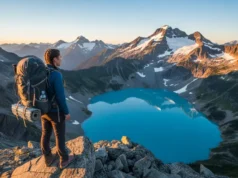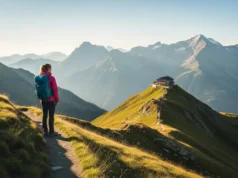In this article
This guide serves as your comprehensive planning tool for exploring the world-class hiking in and around Vancouver, BC. We’ll move beyond simple lists to provide the critical context you need, aligning with our mission to foster skilled, safe, and responsible hikers (senderistas). We will cover everything from easy family-friendly walks to demanding mountain ascents, ensuring you find the perfect trail for your adventure. You will discover why Vancouver is a unique hiking destination, learn how to select hikes based on your goals, and embrace the core principles of safety and stewardship. We also acknowledge that these lands are the traditional, ancestral, and unceded territories of Coast Salish Peoples.
Vancouver’s Best Easy Hikes: Perfect for Beginners and Families

Explore accessible yet rewarding trails, ideal for those new to hiking, families with children, or anyone seeking a beautiful walk in nature or some easy day hiking. These day hikes typically feature minimal elevation gain and well-maintained walking trails, making them excellent starting points for discovering the North Shore mountains and beyond.
Quarry Rock (Deep Cove)
This short but immensely popular hike offers a classic Vancouver viewpoint overlooking the serene waters of Indian Arm and the Belcarra mountains. The trail is a great introduction to North Shore hiking, with well-maintained dirt paths, wooden staircases, and boardwalks. Due to its popularity, expect significant crowds, especially on sunny weekends. The reward-to-effort ratio is extremely high, making it a go-to for a quick hike with a dose of nature. As many locals will tell you, Quarry Rock is a nice short hike at 3.7 km round-trip.
The hike takes most people 1.5-2 hours. Parking in Deep Cove, North Vancouver, is notoriously difficult; consider arriving very early or using transit. While dogs are permitted on leash, the trail can be too crowded for some pets. For the latest details on access, consult the District of North Vancouver park information.
Lighthouse Park (West Vancouver)
Lighthouse Park provides a quintessential West Coast experience, protecting some of the last remaining old-growth Douglas firs in Metro Vancouver. The park features a network of easy, interconnected trails that wind through the magnificent forest down to a rugged beach and scenic shoreline viewpoints. You can create loops of varying lengths, from a short 2 km walk to a longer 6 km exploration. The main attraction is the Point Atkinson Lighthouse, a National Historic Site watching over the entrance to the bay.
The trails offer stunning views across Howe Sound towards Bowen Island. This is an excellent choice for a rainy day, as the massive forest canopy provides some shelter. While the main trails are easy, our Senderista Tip is to explore the smaller, more rugged side paths to secluded coves for a more peaceful walk and a greater sense of discovery. Remember that coastal rocks can be extremely slippery when wet. More information can be found through West Vancouver community information.
Dog Mountain (Mount Seymour)
Offering one of the best scenic payoffs for minimal effort, the Dog Mountain trail is a local favorite, especially as an introduction to winter hiking and as a popular snowshoe trail. The 5 km round-trip trail has very little elevation gain, but the terrain is famously technical, with a constant tangle of slippery roots, mud, and rocks requiring careful footwork. It is not a simple walk in the park. The trail leads to a stunning bluff with panoramic views of Vancouver and Mount Baker.
In winter, especially after proper snow, the landscape transforms into a wonderland perfect for a sunny winter day. Microspikes are absolutely essential for a safe winter or shoulder-season hike. Safety Alert: A BC Parks Day-Use Pass is often required for vehicles to access the Mount Seymour parking lot, and winter-rated tires are mandatory. Always check for the latest pass requirements by reviewing the Mount Seymour Park hiking details.
Vancouver’s Best Moderate Hikes: The Sweet Spot of Effort and Reward
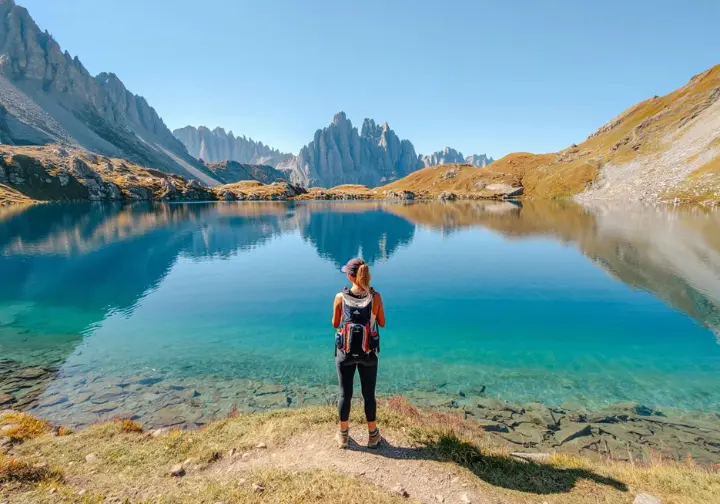
For hikers comfortable with a few hours of steady climbing and more rugged terrain, these trails offer spectacular rewards. From iconic alpine lakes to sweeping mountain views, they represent some of the most classic hikes in the Vancouver area. They are the perfect step up from beginner hikes and build the fitness needed for more challenging objectives.
St. Mark’s Summit (Cypress Provincial Park)
As the first peak along the renowned Howe Sound Crest Trail, St. Mark’s Summit is a fantastic objective for intermediate hikers. The 11 km round-trip trail involves a steady climb of 460 meters, mostly on well-defined switchbacks, before a final, more technical section to the summit viewpoint. This hike provides a true mountain experience without requiring an all-day epic. The reward is one of the region’s most iconic top-down perspectives of Howe Sound and the distant Tantalus mountain range.
There are several rocky outcrops at the summit, but be extremely cautious as they have sheer, exposed drop-offs. Leave No Trace Focus: The summit area is a fragile subalpine environment. Please stay on designated paths and durable rock surfaces. The Gray Jays here are notorious; do not feed them, as it harms their natural habits. You can find more information about Cypress Park hiking and skiing on the official site.
Joffre Lakes (Joffre Lakes Provincial Park)
Famous for its three brilliantly turquoise-colored alpine lakes, Joffre Lakes is one of BC’s most iconic hikes. Its popularity means you must be prepared for crowds on this notoriously busy hike and a competitive day-use pass system. The 10 km round-trip trail gains 370 meters and gets progressively steeper as you ascend from the Lower, to the Middle, and finally to the stunning Upper Lake at the base of a glacier, offering a stunning glacier mountain backdrop. Meticulous planning is required to secure a pass.
Cultural Context: The park is in the traditional territory of the Lílʼwat and N’Quatqua First Nations and is known as Pipi7íyekw, a place of cultural significance. Visitors are asked to be respectful, pack out everything they pack in, and note that swimming is now prohibited. Check the BC Parks website for Joffre Lakes Park cultural information.
Garibaldi Lake (Garibaldi Provincial Park)
This is a cornerstone BC hike, leading to a massive, jaw-droppingly blue alpine lake surrounded by glaciated peaks. The hike itself is a long but not overly steep grind, covering 18 km round-trip with 820 meters of elevation gain on a seemingly endless series of well-graded switchbacks. The wide, well-maintained trail is a great fitness test for aspiring backpacking enthusiasts. The sheer scale and intense color of the water, with the Sphinx Glacier in the background, make the long walk in worthwhile.
Logistics & Permits: A free BC Parks Day-Use pass is required for Garibaldi Provincial Park trailheads during the summer. Similar to Joffre Lakes, these are booked two days in advance at 7 AM and are in high demand. Dogs are not permitted in Garibaldi Park. Always review the latest Garibaldi Provincial Park regulations before planning your trip.
Vancouver’s Best Challenging Hikes: For Experienced Adventurers
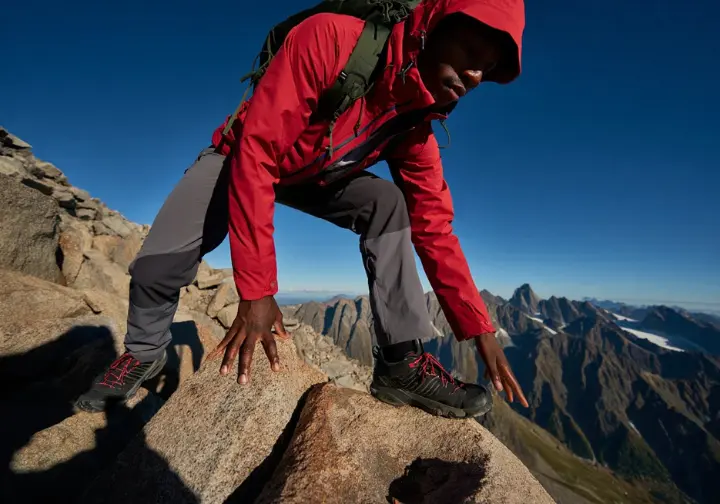
These hiking trails are for fit, experienced hikers prepared for long days, significant elevation gain, rugged terrain, and potential route-finding challenges. Proper preparation, gear, and an honest assessment of your abilities are non-negotiable for these demanding ascents.
The Grouse Grind & BCMC Trail
Known as “Mother Nature’s Stairmaster,” the Grouse Grind is a relentless fitness challenge, not a traditional hike. It’s a fitness challenge up one of Vancouver’s most iconic mountains—Grouse Mountain. It’s a 2.5 km trail that gains a staggering 800 meters via 2,830 stairs. It is strictly one-way; all hikers must purchase a ticket for the Skyride gondola to descend. For a more authentic hiking experience, the adjacent BCMC Trail, a true ascent trail, offers a rugged, rooty, and natural alternative.
Safety Rationale: Downhill travel is prohibited on the Grouse Grind primarily to prevent erosion and the dislodging of rocks, which poses a serious hazard to the hundreds of hikers below. It also prevents dangerous collisions on the narrow steps. Before you go, check The Grouse Grind trail rules.
Panorama Ridge (Garibaldi Provincial Park)
This is one of the most spectacular day hikes, or even a multi-day trek, in all of British Columbia, culminating in an unforgettable 360-degree panoramic view of Garibaldi Lake, Black Tusk, and a sea of glaciated summits. This view comes at a cost: it’s a very long and demanding day, covering 30 km with 1,520 meters of elevation gain, taking most parties 10-12 hours. The trail follows the Garibaldi Lake path before climbing steeply through Taylor Meadows to a final, rocky scramble.
Many choose to do this as an overnight trip, which makes the final ascent more manageable. Pro Gear Tip: Due to the extreme distance and descent, trekking poles are considered essential, not optional, as they dramatically reduce the impact on your knees. For conditions, always check for official BC Parks reports.
The Lions (Binkert Trail)
The twin peaks of The Lions are one of Vancouver’s most recognizable landmarks and offer a formidable challenge. The Binkert Trail from Lions Bay is a steep, sustained, and rugged 16 km round-trip climb with 1,280 meters of elevation gain. The trail is relentlessly steep, with sections requiring hands to pull yourself up over roots and rocks. The trail leads to a col between the two peaks, offering incredible views.
Crucial Safety Distinction: The hike ends at the base of the peak. The final ascent to the summit of the West Lion is a technical, exposed Class 4/5 scramble that has been the site of numerous accidents. It should only be attempted by experienced scramblers and climbers with proper equipment. Trailhead parking in Lions Bay is extremely limited and requires payment, so arrive very early.
Essential Knowledge for Every Vancouver Hiker
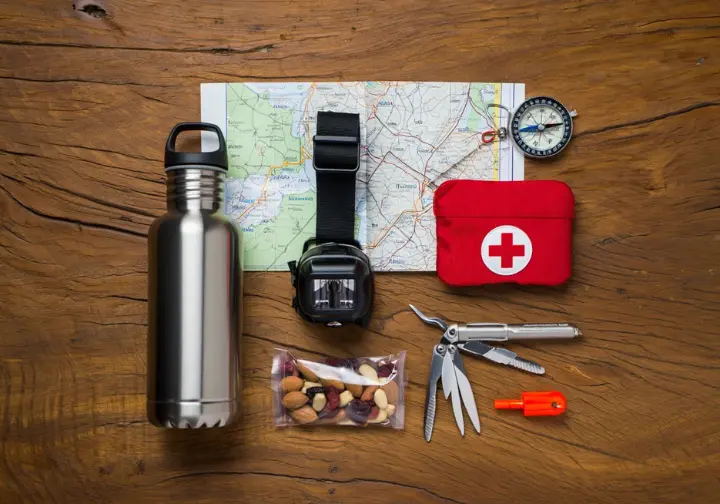
Mastering these foundational safety, logistical, and ethical basics is the most important step you can take to ensure a safe and enjoyable experience in the mountains of British Columbia.
Applying the Three T’s: Trip Plan, Train, and Take the Essentials
Endorsed by SAR groups and outdoor guides across Canada, the “Three T’s” framework is the gold standard for backcountry safety. Trip Planning means researching your route thoroughly and leaving a detailed plan. Training means being realistic about your physical fitness and starting with easier trails. Being prepared for the demands of the trail is one of the best ways to prevent injuries.
Taking the Essentials refers to carrying The Ten Essentials on every single hike. This system includes items for navigation, illumination, sun protection, first-aid, fire, shelter, extra food, extra water, and repair tools. These items can be lifesaving in an unexpected situation.
Navigating the System: Permits, Passes, and Parking
Many of BC’s most popular provincial parks now require a free but mandatory Day-Use Pass for vehicle access during peak seasons. This critical trail info is designed to manage crowds and reduce environmental impact. Passes are booked online via the BC Parks website, typically becoming available at 7 AM two days prior. Beyond parks, many trailheads in municipalities like Lions Bay and Anmore have limited pay-parking systems that fill up early.
Pro-Tip: For the latest, real-time updates, check official park websites before you go. The Metro Vancouver park alerts and notices page is an invaluable resource.
The 7 Leave No Trace Principles in Practice
Leave No Trace is an ethical framework designed to help us enjoy the outdoors responsibly. It is built on seven core principles, including planning ahead, traveling on durable surfaces, and disposing of waste properly. Learning about practicing Leave No Trace principles is a fundamental step for every new hiker.
Pack It In, Pack It Out: This is the most fundamental principle. Everything you bring out, including all food scraps. Respect Wildlife & Be Considerate of Others: Observe wildlife from a distance and never feed them. Keep your voice low so everyone can enjoy the natural sounds. Uphill hikers have the right-of-way. You can learn more with these Leave No Trace principles explained by the NPS.
Gearing Up: What to Wear and Pack for Vancouver Trails
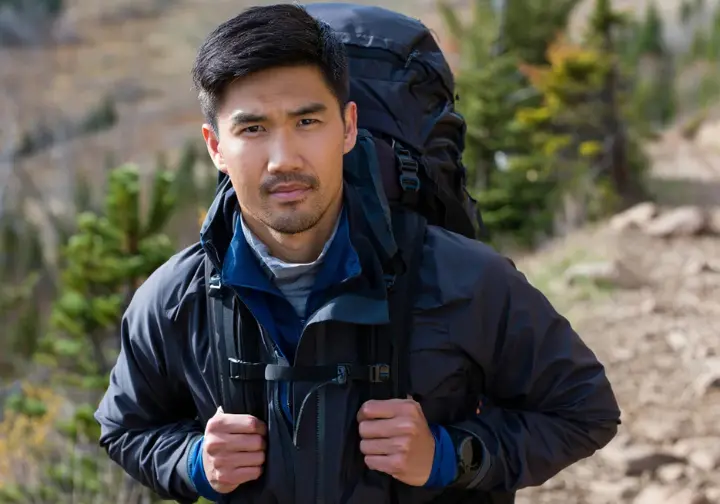
Having the right gear is about more than comfort; it’s a critical component of safety in BC’s mountains, where weather can change in an instant. This section covers the non-negotiable fundamentals.
Footwear Fundamentals: Ditch the Runners
The single most important piece of gear is a pair of sturdy, waterproof hiking boots or trail shoes with aggressive tread. The terrain on most trails is characterized by roots, rocks, and mud where running shoes provide inadequate support. As North Shore Rescue bluntly states, “Runners are a terrible choice for hiking.” Investing in proper footwear provides essential ankle support and waterproofing to keep feet dry and prevent blisters. Look for boots with a stiff sole and a protective toe cap.
The Art of Layering: The “No Cotton” Rule
The key to staying comfortable in BC’s variable weather is a layering system. This allows you to regulate your body temperature and is built on the golden rule: “Cotton Kills.” Cotton absorbs moisture and loses its insulating properties when wet. Your system should consist of a synthetic or wool base layer, a fleece or puffy mid-layer for insulation, and a waterproof-breathable outer shell. Always pack more layers than you think you’ll need, including a toque and gloves.
Specialized Traction: Microspikes and Poles
Two pieces of gear that transition from nice-to-have to essential are trekking poles and microspikes. Trekking poles reduce strain on your knees during steep descents and improve balance. Microspikes are flexible chains with small spikes that fit over your boots, providing incredible grip on packed snow or ice. They are indispensable for winter hiking on trails like Dog Mountain or St. Mark’s Summit. Do not confuse microspikes with more aggressive crampons, which are for mountaineering.
Level Up: Advanced Skills for the Dedicated Hiker
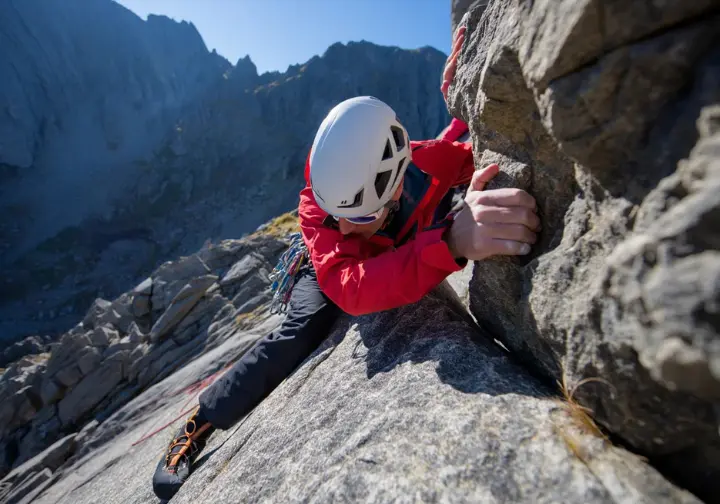
For those looking to push their boundaries and explore more technical terrain, mastering advanced skills is the next step. This is where hiking begins to blend with mountaineering, requiring a greater degree of knowledge and risk management.
Introduction to Scrambling (Class 2-3)
Scrambling is the middle ground between hiking and technical rock climbing, a true hands-on hike where you must use your hands for balance and upward progress. An Introduction to Scrambling is necessary before attempting many of Vancouver’s most iconic peaks, such as The Lions or Crown Mountain. Mastering it requires confidence with exposure and solid footwork. A climbing helmet is highly recommended due to the risk of rockfall. Start on easier scrambles to build your skills.
Key Takeaways on Vancouver Hiking
Vancouver offers an unparalleled variety of hiking experiences, but enjoying them safely is paramount. This guide has equipped you with the knowledge to choose the right trail and prepare for your adventure.
- Plan Meticulously: Always research your trail, check conditions, and leave a detailed trip plan.
- Gear Up for Success: Invest in proper footwear and a non-cotton layering system. These are non-negotiable safety items in BC’s mountains.
- Start Easy, Progress Smartly: Honestly assess your fitness. Gradually increase the difficulty from easy, snow-free hikes to a challenging hike.
- Hike Responsibly: Practice Leave No Trace principles on every outing to protect these beautiful natural spaces.
- Embrace the Senderista Mindset: Continue to learn and develop your skills. A prepared hiker is a safe hiker.
Frequently Asked Questions about Vancouver’s Best Hikes
How can I find out the current trail conditions before I go? +
Do I really need a day-use pass for parks like Garibaldi and Joffre Lakes? +
Can I get to any popular trailheads using public transit? +
Joffre Lakes sounds too crowded. What’s a good alternative with a similar feel? +
We are a participant in the Amazon Services LLC Associates Program, an affiliate advertising program designed to provide a means for sites to earn advertising fees by advertising and linking to Amazon.com. As an Amazon Associate I earn from qualifying purchases. We also participate in other affiliate programs. The information provided on this website is provided for entertainment purposes only. We make no representations or warranties of any kind, expressed or implied, about the completeness, accuracy, adequacy, legality, usefulness, reliability, suitability, or availability of the information, or about anything else. Any reliance you place on the information is therefore strictly at your own risk. Additional terms are found in the terms of service.




